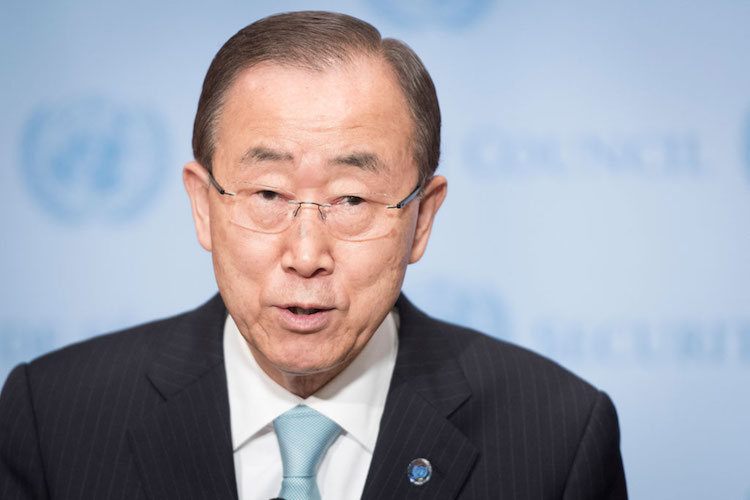By J Nastranis
NEW YORK (IDN) – Ahead of the third straw poll – an upcoming game of musical chairs – on August 29, Secretary-General Ban Ki-moon has made public his preference for a woman to replace him as the head of the United Nations.
“It’s high time now” for a female Secretary-General after eight men at the helm of the world organization in over 70 years, said Ban whose second term comes to an end on December 31, 2016.
“We have many distinguished and eminent women leaders in national governments or other organizations or even business communities, political communities, and cultural and every aspect of our life,” he said in an Associated Press interview on August 11. “There’s no reason why not in the United Nations.”
It is the first time that an outgoing Secretary-General has made his preference public – just as it is the first time that the process of the election for the world’s highest post, whose incumbent is expected to be a “world’s moderator”, has become transparent, thanks due to the current UN General President Mogens Lykketoft.
The first round in musical chairs started on July 21 with 12 candidates vying for the job. Six of them were women. They included: UNESCO Director-General Irina Bokova of Bulgaria; Helen Clark, former Prime Minister of New Zealand and current Administrator of the UNDP; and Natalia Gherman, former Foreign Minister of the Republic of Moldova.
Others were: Susana Malcorra, Minister of Foreign Affairs of Argentina who has also served as UN Under-Secretary-General and Chef du Cabinet of the UN Secretariat; Vesna Pusic, former Foreign Minister of Croatia; and UNFCCC’s chief Christiana Figueres from Costa Rica.
The male candidates were: Antonio Guterres, the former UN High Commissioner for Refugees and ex-Prime Minister of Portugal; Vuk Jeremić, former Minister of Foreign Affairs of Serbia and President of the UN General Assembly; and Dr Srgjan Kerim, former Minister of Foreign Affairs of Macedonia, and UN General Assembly President.
The other three were: Miroslav Lajčák, former High Representative for Bosnia and Herzegovina and Foreign Minister of Slovakia; Dr Igor Luksic, former Prime Minister and current Foreign Minister of Montenegro; and Dr Danilo Turk of of Slovenia, former Assistant Secretary General of the United Nations for Political Affairs and President of Slovenia.
The veto-wielding five Members of the Security Council (P5) – United States, Russia, China, France and Britain – continue to be faced with an uphill task. A candidate favoured by them unanimously will be recommended to the General Assembly, which will elect Ban’s successor before the end of 2016.
While countries fielding candidates have opted out of the traditional geographical rotation that would have ensured the choice of next UN Chief from Eastern Europe, the ambitious goal of selecting for the first time in the 71-year history of the United Nations a woman for the world’s top post appeared not to have been abandoned. Meanwhile, the goal seems to have been forsaken.
When the second straw took place on August 5, one candidate, Croatia’s Vesna Pusic had opted out. The reason: leaked July 21 results showed that she obtained 11 ‘discourage’ votes, including those from 10 non-permanent members of the Council each elected for two years.
According to the leaked results of the August 5 straw poll, former Portuguese Prime Minister Antonio Guterres led the poll, with 11 members encouraging his candidacy, two discouraging and two expressing no opinion. Serbia’s Jeremić obtained 8 ‘encourage’, 4 ‘discourage’ and 3 ‘no opinion’.
Argentina’s Malcorra obtained 8 encourage, 6 discourage and 1 no opinion, followed by Slovenia’s Turk with 7 encourage, 5 discourage and 3 no opinion. Bulgaria’s Bukova had to be satisfied with 7 encourage, 7 discourage and 1 no opinion. New Zealand’s Clark, who has been considered a favourite for the job along with Bukova, obtained 6 encourage, 8 discourage and 1 no opinion.
Analysing the leaked results of previous two straw polls, a diplomat wanting not to be named said the choice appears to have been reduced to five candidates: two men and three women. Three of the five aspirants who seem to be favoured are from Eastern Europe: Serbia, Slovenia and Bulgaria.
It remains to be seen who from among five would be excluded – with overwhelming ‘discourages’ – in the upcoming round of musical chairs, said the diplomat. Will it be Argentina’s Malcorra, because she is foreign minister of a country that triggered the ten week-long Falklands War against UK on April 2, 1982?
Will it be New Zealand’s Clark, current head of the UNDP, because she belongs to the Western European and Others Group (WEOG) coalition in the UN, to which three former heads of the world body belonged: Trygve Lie (Norway), Dag Hammarskjöld (Sweden), and Kurt Waldheim (Austria).
Come August 29 and leaks will indicate which way the wind is blowing. [IDN-InDepthNews – 22 August 2016]
Photo: Secretary-General Ban Ki-moon. UN Photo/Mark Garten (file)
IDN is flagship of the International Press Syndicate.

